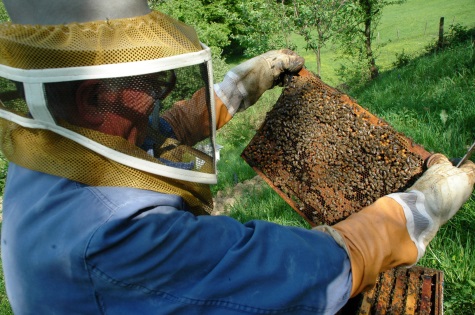11
Apr
Maryland Legislature Bans Retail Sales of Bee-Toxic Neonicotinoid Pesticides
(Beyond Pesticides, April 11, 2016) In a historic move, the Maryland legislature voted to become the first state in the nation to ban consumers from using products containing neonicotinoid pesticides, a class of bee-toxic chemicals that has been linked to the startling decline in bees and other pollinators around the world. The bill now heads to Governor Larry Hogan to sign or veto.
 The Pollinator Protection Act was approved by lawmakers on Thursday by a 98-39 vote in the Maryland House of Delegates. While consumers will not be allowed to buy pesticide products containing neonicotinoids starting in 2018, the legislation’s reach does not extend to farmers, veterinarians, and certified pesticide applicators, who will still be permitted to apply the chemicals. Consumers can also buy treated plants and seedlings from stores without any labeling. Cumulatively, these present major sources of exposure for bees and other pollinators.
The Pollinator Protection Act was approved by lawmakers on Thursday by a 98-39 vote in the Maryland House of Delegates. While consumers will not be allowed to buy pesticide products containing neonicotinoids starting in 2018, the legislation’s reach does not extend to farmers, veterinarians, and certified pesticide applicators, who will still be permitted to apply the chemicals. Consumers can also buy treated plants and seedlings from stores without any labeling. Cumulatively, these present major sources of exposure for bees and other pollinators.
The bill originally included a requirement that companies put labels on plants and seeds that are treated with neonicotinoids, but that provision was ultimately pulled from the bill. Hardware stores like Home Depot and Lowe’s had previously announced that they were voluntarily phasing out the supply of neonicotinoid-treated plants over the next two to three years. Home Depot previously decided to start requiring all nursery plants that have been treated with neonicotinoids to carry a label to inform customers, following a report written last year. The report, Gardeners Beware (2014), shows that 36 out of 71 (51 percent) of garden plant samples purchased at top garden retailers in 18 cities in the United States and Canada contain neonicotinoid pesticides. Some of the flowers contained neonic levels high enough to kill bees outright and concentrations in the flowers’ pollen and nectar were assumed to be comparable. Further, 40% of the positive samples contained two or more neonics.
As the bill made its way through the legislature, an amendment was attached to the Senate language, and later rejected, that implied legislative intent to preempt (take away) the authority of municipalities in Maryland to adopt local pesticide restrictions that are more restrictive than state policy on all property within their jurisdiction. The Senate language, which required a report and recommendation “to ensure state laws and regulations are consistent” with EPA, would have put the legislature on record, for the first time, as seeking to ensure preemption. Maryland is one of seven states that does not preempt local jurisdictions from adopting pesticide restrictions more stringent than the state. Last year, Montgomery County, Maryland, with over one million residents, adopted a landmark ordinance that phases out the use of toxic pesticides, including all neonicotinoid use, for turf management on private and public land. This followed the adoption of similar ordinances in Takoma Park, Maryland, and Ogunquit, Maine.
The pollinator bill was opposed by the pesticide industry, the Maryland Farm Bureau, the National Federation of Independent Businesses, the Maryland Department of Agriculture, and other groups.
Proactive state and local steps to address the issue of pollinator decline is critical in the absence of federal action. Beyond Pesticides has long advocated a regulatory approach that prohibits toxic pesticide use and requires alternative assessments. Farm, beekeeper, and environmental groups, including Beyond Pesticides, have urged EPA to follow the European Union’s lead and suspend the huge numbers of other bee-harming pesticides already on the market. We suggest an approach that rejects uses and exposures deemed acceptable under risk assessment calculations, and instead focuses on safer alternatives that are proven effective, such as organic agriculture, which prohibits the use of neonicotinoids. See Bee Protective to learn how you can help.
Sources: Baltimore Sun
All unattributed positions and opinions in this piece are those of Beyond Pesticides.










